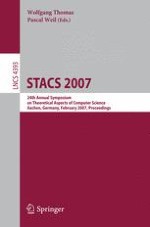2007 | OriginalPaper | Chapter
Cheating to Get Better Roommates in a Random Stable Matching
Activate our intelligent search to find suitable subject content or patents.
Select sections of text to find matching patents with Artificial Intelligence. powered by
Select sections of text to find additional relevant content using AI-assisted search. powered by
This paper addresses strategies for the stable roommates problem, assuming that a stable matching is chosen at random. We investigate how a cheating man should permute his preference list so that he has a higher-ranking roommate probabilistically.
In the first part of the paper, we identify a necessary condition for creating a new stable roommate for the cheating man. This condition precludes any possibility of his getting a new roommate ranking higher than all his stable roommates when everyone is truthful. Generalizing to the case that multiple men collude, we derive another impossibility result: given any stable matching in which a subset of men get their best possible roommates, they cannot cheat to create a new stable matching in which they all get strictly better roommates than in the given matching.
Our impossibility result, considered in the context of the stable marriage problem, easily re-establishes the celebrated Dubins-Freedman Theorem. The more generalized Demange-Gale-Sotomayor Theorem states that a coalition of men and women cannot cheat to create a stable matching in which everyone of them gets a strictly better partner than in the Gale-Shapley algorithm (with men proposing). We give a sharper result: a coalition of men and women cannot cheat together so that, in a newly-created stable matching, every man in the coalition gets a strictly better partner than in the Gale-Shapley algorithm while none of the women in the coalition is worse off.
In the second part of the paper, we present two cheating strategies that guarantee that the cheating man’s new probability distribution over stable roommates majorizes the original one. These two strategies do not require the knowledge of the probability distribution of the cheating man. This is important because the problem of counting stable matchings is #P-complete. Our strategies only require knowing the set of stable roommates that the cheating man has and can be formulated in polynomial time. Our second cheating strategy has an interesting corollary in the context of stable marriage with the Gale-Shapley algorithm. Any woman-optimal strategy will ensure that every woman, cheating or otherwise, ends up with a partner at least as good as when everyone is truthful.
